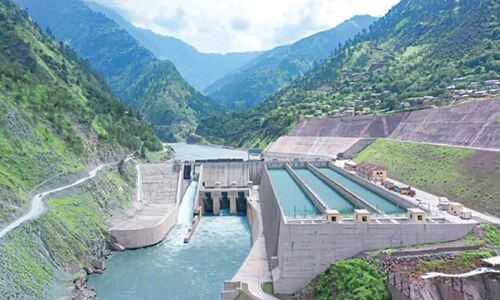KARACHI, June 23: While the State Bank has seen restructuring taking place in many industries and fresh investment pouring in in new industries, import of consumer durables is impeding domestic industry.
In case of household items, smuggling of Korean and Indian TV sets (via Dubai-Afghan Transit Trade route) and under-valuation and under-invoicing of Malaysian and Chinese air-conditioners have put the local industry under stress, said SBP’s third quarterly report issued on Friday.
Demand for fans has substantially fallen because of extreme load-shedding in the Punjab, the report added.
“Chinese rechargeable fans appear to be a better substitute under the circumstances, and are rapidly making way in the domestic market,” said the report, adding that such fans are not being manufactured locally.
The electronics industry is highly protected as average import duty on completely built units is 35 per cent.
The report said restructuring is taking place in many industries which is expected to improve production in the medium to long run.
While identifying factors behind restructuring, the SBP report said steel sector is adapting to the shrinking role of Pakistan Steel and a growing ship-breaking industry.
In energy intensive industries, like glass, steel, and cement, old and inefficient units are facing closures, while new investments in large-scale production facilities, as well as integration of production processes (in steel) is taking place, said the report.
It further said consumers are becoming more aesthetically aware and it had increased competition in wood and paints industry.
Chipboard is substituting plywood because of its multiple colour and design options, as well as lower prices.
Building material industries (BMI) which includes cement, steel, glass-sheet, chipboard, plywood, and solid and liquid paints, has 16.7 per cent share in the overall large scale manufacturing (LSM) index, making it the second largest industry group after textiles.
The year-on-year growth in non-PSM BMI in December-March FY12 averaged at 1.5 per cent compared to 6 per cent average decline in July through November FY12 (overall BMI: -7.9).
Higher energy-related costs were the major reason, said the report.
For example, glass-sheet manufacturers had to use furnace oil during gas-outages which nearly doubled production cost.
Due to the resulting financial difficulties, one glass plant temporarily shut down last year.
In case of cement, three million tons capacities were added in FY12 whereas during FY10-FY11, smaller and inefficient plants of nearly equal combined capacity were shut down.
In case of glass-sheet, two new plants are set to come on line while in case of steel, some rolling mills are setting up their own melt shops. One cold rolling and galvanisation plant came on line in 2011 while another cold-rolling mills is set to be commissioned in 2012.
Tuwairiqi Steel has also reached financial close and would start producing soon.
The report said the steel industry is undergoing a huge transition, necessitated by changing economic dynamics.
Financial meltdown of the Pakistan Steel created a gap in billets and hot-rolled steel market, leading to imports, it added.
Ship-breaking industry grew rapidly over the past two years, supplying cheaper raw material amid high global steel prices.
Because most of the ship scrap (70-90 per cent) is used by the rolling industry, the intermediate steel melting industry is facing low demand.
Frequent outages of electricity and gas have badly affected business.
While financially strong units manage to bear the cost of alternate power arrangements, smaller mills find it difficult to survive.
The industry is making adaptive investments. Firstly, integrated plants are coming online, which are more energy efficient.
Secondly, the private sector is entering high-value market segments, such as cold-rolled and galvanised products, which were previously dominated by the PSM, said the report.
Given the high cost of setting up a business and uncertainty of electricity and gas supply, this is a difficult transition for the industry, the report added.
The SBP report said that some hope appeared in March 2012 when the government made a long overdue adjustment in the tax structure of the industry, which will ease effective steel products prices.














































Dear visitor, the comments section is undergoing an overhaul and will return soon.